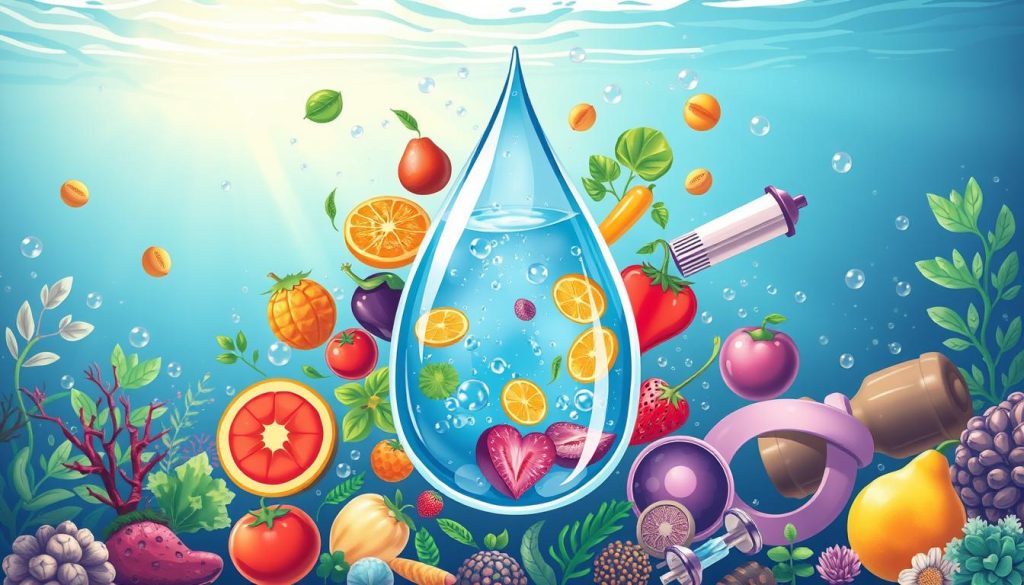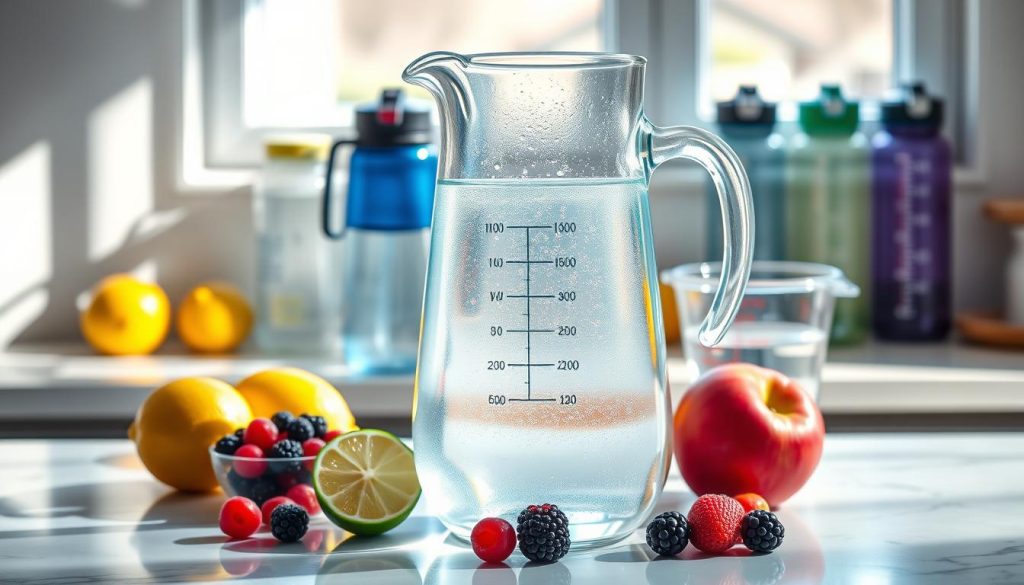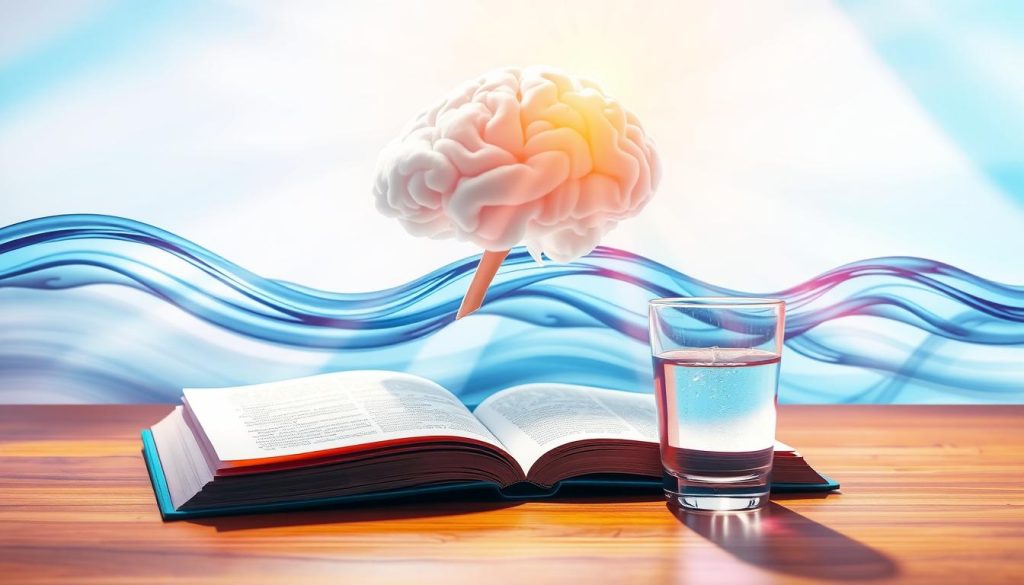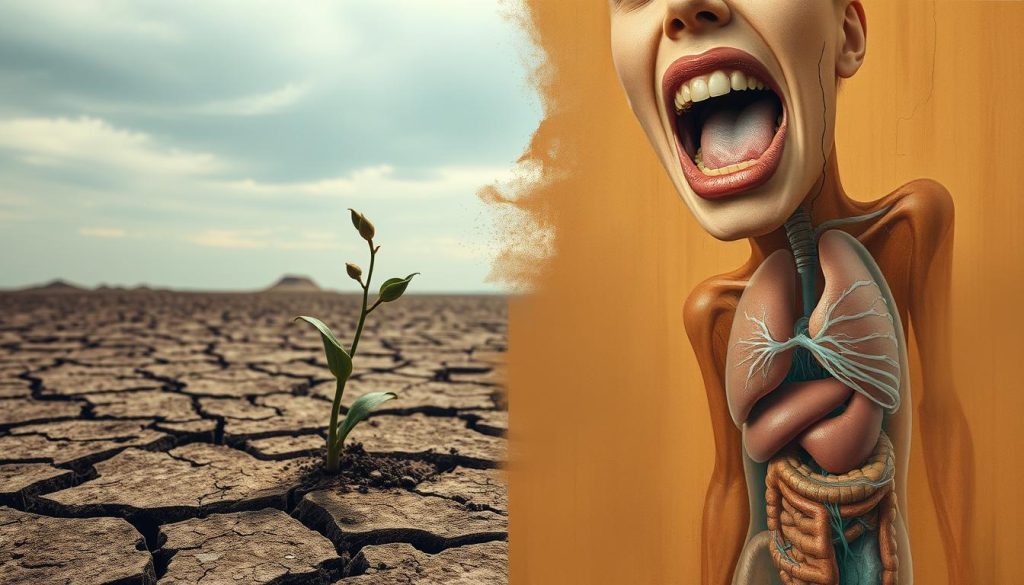Did you know 75% of Americans are not drinking enough water? This fact shows how important it is to know about staying hydrated and its big impact on our health. Our bodies are made up of about 60% water, which is key for many things like keeping our temperature stable, moving our joints, and helping our organs work right.
Experts say drinking enough water can make us sleep better, feel happier, think clearer, and have more energy. Not drinking enough water can lead to health problems. So, it’s important to think about how much water we drink every day.
Key Takeaways
- 75% of Americans experience chronic dehydration.
- Intake of sufficient water improves health and wellness.
- Proper hydration supports cognitive functions and mood enhancement.
- Daily water intake is essential for maintaining energy levels.
- Dehydration can lead to significant health problems.
Understanding Hydration and Its Importance
Hydration means keeping the body moist, which is key for staying healthy. Water makes up about 60% of an adult’s body weight. It helps with temperature control, moving nutrients around, and getting rid of waste.
Being dehydrated by more than 2% can make you feel tired and less focused. Adults should drink about 1.5 liters of water a day. Men need more, about 1.8 to 3.0 liters, and women about 1.6 to 2.2 liters, depending on their age.

Drinking water helps your brain work better. It’s linked to a good mood, better focus, and sharper thinking. Not drinking enough water can make you feel down and hurt your daily tasks.
Not just water drinks, but also foods like tea, dairy, and soups add to your hydration. If you’re working out hard or it’s very hot, you’ll need more water to replace what you lose.
| Source of Water | Percentage of Water Content |
|---|---|
| Beverages (e.g., tea, coffee) | 85-90% |
| Meals (e.g., fruits, vegetables) | 40-80% |
| Oxidation of macronutrients | – |
You can check if you’re hydrated by looking at your pee. If it’s light yellow, you’re good. Darker pee means you might need more water. Knowing how important water is helps you make better choices for your health.
How Much Water Should You Drink Daily?
Knowing how much water you need is key to staying healthy. Our bodies are about 60% water, making it vital for many functions. The old idea of drinking eight 8-ounce glasses a day is just a start. Your needs change based on your activity level, the weather, and your health.
For adults in moderate climates, you should aim for about 15.5 cups (3.7 liters) of fluids a day if you’re a man. Women should aim for 11.5 cups (2.7 liters). This amount helps keep you hydrated. But remember, not all fluids have to be plain water. About 20% of your fluids can come from fruits, veggies, and other drinks.
People who are active or athletes need more water. The American College of Sports Medicine says to drink about 17 ounces of fluid two hours before you start exercising. Drinking enough water boosts your performance and keeps your gut healthy, helping prevent constipation.
Kids should mainly drink water and milk for hydration, and try to avoid sugary drinks to prevent weight gain. Adults should choose lower-fat milk and unsweetened plant-based drinks instead. It’s best to limit fruit juices and smoothies to just one small glass (150ml) a day because they’re high in sugar.
Here’s a quick guide to water intake for different groups:
| Audience | Recommended Daily Fluid Intake |
|---|---|
| Men | 15.5 cups (3.7 liters) |
| Women | 11.5 cups (2.7 liters) |
| Children | Water and milk, limit sugary drinks |
| Athletes | 17 ounces before exercise |

The Benefits of Hydration: How Water Impacts Your Health
Drinking enough water is key for good health, especially for your body’s performance and your mind. Water makes up about 60% of our bodies. It’s essential for staying healthy. Knowing how water helps with exercise and thinking can help you drink more water every day.
Physical Performance and Endurance
Drinking water and exercising go hand in hand. Drinking enough water can really improve how well you perform. Losing just 2% of your body weight to dehydration can make you weaker and less able to keep going.
Water helps keep your body cool when you’re working out hard. This means you won’t get as tired. Drinking water during exercise keeps your energy up and helps prevent overheating.
Cognitive Function and Mental Clarity
Water is also good for your brain. Losing a little bit of body weight can make you feel grumpy, unfocused, and less sharp. Drinking water helps you think clearly, make better choices, and remember things better.
It’s not just for athletes. Drinking water helps everyone do better in school, work, and daily life. It’s good for your mind and body.

Eating foods like watermelon, cucumbers, and strawberries can also help you stay hydrated. Drinking enough water is important for everyone. It helps you do better in sports and in everyday life.
How Dehydration Affects Your Body
It’s key to know how dehydration impacts our health. Dehydration can cause both short-term and long-term problems. These issues affect how our bodies work. By understanding them, we can focus on staying hydrated and prevent health issues.
Short-term and Long-term Effects
Even a small amount of dehydration can hurt how we perform physically and think clearly. Adults may feel tired, moody, and less sharp if they lose just 1% of their fluids. Losing 2% of water can make physical tasks harder, especially during exercise. Headaches and migraines can also happen if we don’t drink enough water.
Long-term dehydration can make chronic health problems worse. Not drinking enough water can lead to kidney stones and urinary tract infections. These are serious risks from dehydration over time. For kids, losing 1% of their fluids can mean they’re already dehydrated. This can lead to serious health issues if not fixed.
| Effect | Short-term | Long-term |
|---|---|---|
| Cognitive Function | Mood swings, decreased concentration | Potential for chronic brain fog |
| Physical Performance | Fatigue, decreased endurance | Increased risk of heat-related illnesses |
| Headaches | Triggered by mild dehydration | Possible chronic migraines |
| Kidney Health | Increased risk during dehydration | Higher likelihood of kidney stones |
| Digestive Health | Constipation risk | Complications due to chronic low fluid intake |

The Role of Water in Digestion and Metabolism
Water is key to digestion and metabolism, playing a big role in digestive health. It helps break down food and moves nutrients to cells. When we drink enough water, our body uses energy from food better.
Drinking water keeps us from getting constipated, helping us have regular bowel movements. Drinking mineral water can make bowel movements more frequent and make stools easier to pass. This is why water is so important for a healthy gut.
Being well-hydrated also boosts metabolism. A study found that drinking 500 milliliters of water can make metabolism 30 percent faster. This shows how important water is for using energy.
Water helps make saliva, which makes food moist and releases digestive enzymes. Drinking enough water during meals doesn’t weaken digestive juices; it helps the digestive process. It also helps absorb minerals and works with soluble and insoluble fibers to keep bowel movements regular.
Following the daily water intake guidelines can improve hydration and metabolism, which is good for digestion. Understanding water’s role in our body helps us stay healthy by drinking enough water.
Hydration for Healthy Skin and Aging
Drinking enough water is key for good skin health. It keeps the skin moist, making it look young and supple. The skin has three layers that need water to stay healthy. Drinking about 2.25 liters (9.5 cups) of water a day can make your skin better in four weeks.
As we get older, our skin loses density. This happens because collagen and elastin break down. So, keeping skin hydrated is crucial to fight aging signs. Not drinking enough water can make skin thinner, especially if you were already not well-hydrated.
Using a good skincare routine and staying hydrated helps your skin. When it’s hot, drink more water to avoid dehydration. Also, don’t drink too much alcohol, stop smoking, and use sunscreen. Eating foods like fruits, veggies, whole grains, healthy fats, and lean proteins also helps your skin.
| Skin Health Tips | Recommended Actions |
|---|---|
| Hydration | Drink 2.25 liters (9.5 cups) of water daily |
| Skincare Routine | Moisturize regularly and wear sunscreen |
| Diet | Include fruits, vegetables, and whole grains |
| Avoid Negative Habits | Limit alcohol and quit smoking |
| Climate Considerations | Increase water intake during heat |
By focusing on hydration and following these tips, you can greatly improve your skincare. This will also help you stay healthy as you age.
The Connection Between Hydration and Weight Management
Understanding how hydration affects weight management can change how you view diet and health. Water is key in controlling appetite and boosting metabolism. It’s a simple yet powerful tool for those looking to manage their weight. Proper hydration changes how our bodies process food and energy, making it crucial for weight loss.
Water’s Role in Appetite Control
Drinking water before meals can help you eat less. A 2016 study showed that drinking two glasses of water before a meal led to 22% less eating. This shows how water can help control hunger levels. A 2018 study also found that drinking water before meals makes people feel fuller and eat less.
Hydration also boosts metabolism. A 2003 study found that drinking two cups of water increased metabolism by 30% in healthy adults. This means you burn more calories, helping with weight loss. A 2015 study showed that replacing calorie-rich drinks with water helped overweight or obese women lose weight.
Keeping hydrated helps with fat metabolism too. Dehydration can slow down burning fat for energy. Even a 2% drop in body water can hurt brain function, showing how important staying hydrated is for health.
Adding more water to your day can help with weight loss. Swapping sugary drinks for water reduces calories and helps control hunger. This makes it easier to follow your diet.
| Research Study | Findings |
|---|---|
| 2016 Study | Drinking 2 glasses of water before meals led to 22% less food intake. |
| 2003 Study | Drinking 2 cups of warm water increased metabolic rates by 30%. |
| 2015 Study | Replacing diet beverages with water resulted in greater weight loss. |
| 2018 Study | Water consumption before meals helped reduce appetite in average weight individuals. |
| 2021 Study | Water fasting led to significant weight loss but is not recommended without medical supervision. |
Tips for Staying Hydrated Throughout the Day
Drinking enough water is key to good health. Using daily hydration strategies helps keep your body’s fluids at the right level. Making small changes can make a big difference. Here are some easy ways to stay hydrated.
Incorporating Hydrating Foods into Your Diet
Eating hydrating foods is a tasty way to drink more water. Fruits and veggies are full of water, adding to your hydration. Here are some top picks:
- Watermelon
- Cucumbers
- Oranges
- Strawberries
- Celery
- Tomatoes
Don’t forget to drink water regularly. Keep a refillable water bottle with you to remind you to sip. Paying attention to how much you drink is key to good hydration.
Also, cut down on caffeine and alcohol as they can make you lose more water. Herbal teas are a better choice, offering hydration without the downsides of caffeine.
| Hydrating Foods | Water Content (%) |
|---|---|
| Watermelon | 92 |
| Cucumbers | 95 |
| Oranges | 86 |
| Strawberries | 91 |
| Celery | 95 |
| Tomatoes | 95 |
Adding these foods to your meals and following these hydration tips makes staying hydrated simple and fun.
Recognizing Signs of Dehydration
It’s crucial to pay attention to your body’s need for water to stay healthy. Spotting dehydration early can stop minor issues from getting worse. Look out for signs like thirst, dry mouth, and fatigue. If you’re not drinking enough water, you might feel dizzy or notice your urine has changed color.
Urine color is a good way to check if you’re drinking enough water. If it’s dark yellow or amber, you need more water. But if it’s pale straw, you’re probably drinking enough. It’s important to act on these signs early.
Severe dehydration can cause a fast heartbeat, confusion, and even fainting. These symptoms might mean you need to see a doctor.
Keeping track of your water intake can help you notice dehydration. Watch how your body reacts to the amount of water you drink. Pay attention to headaches, feeling irritable, or having trouble concentrating. These signs can tell you if you need to drink more water. By paying attention to these signs, you can make sure you’re always hydrated.
Conclusion
Hydration is key to staying healthy and feeling good. Drinking enough water helps with many body functions, like how well we move, think, digest food, and keep our skin looking good. Studies show that not drinking enough water can hurt our brain power, especially as we get older.
Even being a little dehydrated can make us feel grumpy and less sharp, as shown in studies on college students. Since most of our blood is water, drinking enough is crucial every day. Staying hydrated has big benefits for our mind and body over time.
By paying attention to how much water we drink and making habits to drink more, we can live better. Making sure we drink enough water is a big step towards better health. It’s an important habit for anyone wanting to feel more alive and healthy.
FAQ
What are the key benefits of hydration for health?
Drinking enough water is key for your body’s functions, better physical performance, and sharper mind. It helps control body temperature, keeps joints lubricated, and moves nutrients around.
How can I tell if I’m drinking enough water?
Watch for signs like thirst, a dry mouth, and the color of your pee. Hydrated pee should be light yellow. Feeling tired, getting headaches, or feeling confused means you might be dehydrated.
Can I get enough hydration from foods?
Yes, eating fruits and veggies with lots of water helps too. Think watermelon, cucumbers, and oranges. Herbal teas and some drinks also add to your fluids.
What are some practical tips for staying hydrated?
Drink water regularly, eat hydrating foods, and set phone reminders. A reusable water bottle can remind you to drink more and help you stay on track.
How much water should I drink each day?
Aim for about 11 cups (2.7 liters) if you’re a woman, and 16 cups (3.7 liters) if you’re a man. Your activity level, where you live, and your body can change these amounts.
What are the effects of dehydration on physical performance?
Not drinking enough water can make you tired and cut down your endurance. Losing 2% of your body weight in water can hurt your exercise performance. So, it’s key to drink water, especially when you’re active.
Are there long-term consequences of inadequate hydration?
Yes, not drinking enough water can lead to serious health problems. This includes kidney stones, urinary tract infections, and making existing conditions worse. It can also lead to chronic illnesses if you don’t drink enough fluids over time.
How does hydration support healthy skin?
Drinking enough water keeps your skin moist, boosts blood flow, and helps clean out toxins. This can make your skin clearer, look younger, and keep skin cells healthy by giving them what they need.
How can hydration affect weight management?
Drinking water can help you feel full, so you eat less. This can help you lose weight. Drinking water before meals can also help with weight loss, and staying hydrated can make your metabolism faster.
What should I do if I recognize symptoms of dehydration?
If you feel thirsty or tired, drink fluids, like water, right away. Keep an eye on how much you drink all day to stay hydrated. Listening to your body is the best way to manage your hydration.


